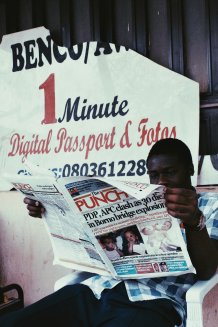
The study says social media literacy campaigns are unlikely to be effective unless they have influence in wider society
The spread of fake news through "pavement media" in Africa means the continent needs unique techniques to tackle the spread of misinformation, a new study says.
Discussions about current affairs in marketplaces, places of worship, bars, and other social spaces, and through songs, sermons, and graffiti form a key part of the media ecosystem in Africa.
This – combined with traditional media – means information from social media quickly crosses into offline spaces. New research carried out in Ghana says this means efforts intended to combat the spread of misinformation need to move beyond Western-centred conception of what constitutes "media" and take different local modalities of media access and fact-checking into account.
The study, in the journal African Affairs, says social, traditional and pavement media are all used to spread fake news and misinformation in the country. Those using social media are usually able to independently assess the accuracy of information they read. They are keenly aware of the prevalence of misinformation on social media and generally more suspicious of social media content.
Those who hear about misinformation on social media second-hand, or via pavement radio are less likely to question it, leaving them more vulnerable. They usually hear about this information from people they trust, and through existing social hierarchies, so are more likely to take it at face value.
The study was carried out by Professor Elena Gadjanova from the University of Exeter, Professor Gabrielle Lynch from the University of Warwick and Dr Ghadafi Saibu from the Bayreuth International Graduate School of African Studies.
Dr Gadjanova said: "Africa's interconnected media spaces and multiple, intersecting, digital inequalities, have significant implications for citizens' patterns of exposure, relative vulnerability, and response to social media misinformation.
"The interconnected media space means that misinformation originating on social media travels through multiple channels simultaneously, significantly increasing its reach. Efforts to battle misinformation should take this into account. There is a need to harness multiple information channels to debunk misinformation: local and national media, common information diffusion spaces, such as markets and high-status individuals who enjoy high levels of trust locally."
The study says social media literacy campaigns are unlikely to be effective unless they have influence in wider society. Beyond encouraging fact-checking on an individual level, governments and civil society should strive to normalize it as social practice, which would empower indirect social media users to exercise more agency in responding to suspected misinformation.
In Africa social media, and the mobile phones that it is usually accessed through, have become a part of everyday life. The study describes the social divide between the highly literate and well off, and those with low literacy skills; between citizens with unlimited access and those with limited opportunities to browse online and those who are offline, but have access to newspapers, TV, and informed social networks, and those who are offline, but have limited access to traditional media and whose friends and family members are similarly disengaged.






